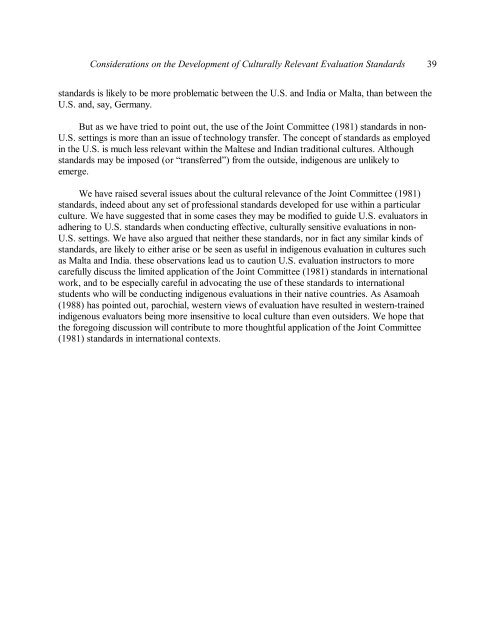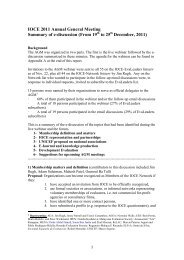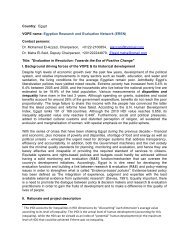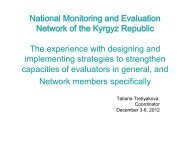The Program Evaluation Standards in International Settings
The Program Evaluation Standards in International Settings - IOCE
The Program Evaluation Standards in International Settings - IOCE
You also want an ePaper? Increase the reach of your titles
YUMPU automatically turns print PDFs into web optimized ePapers that Google loves.
Considerations on the Development of Culturally Relevant <strong>Evaluation</strong> <strong>Standards</strong> 39standards is likely to be more problematic between the U.S. and India or Malta, than between theU.S. and, say, Germany.But as we have tried to po<strong>in</strong>t out, the use of the Jo<strong>in</strong>t Committee (1981) standards <strong>in</strong> non-U.S. sett<strong>in</strong>gs is more than an issue of technology transfer. <strong>The</strong> concept of standards as employed<strong>in</strong> the U.S. is much less relevant with<strong>in</strong> the Maltese and Indian traditional cultures. Althoughstandards may be imposed (or “transferred”) from the outside, <strong>in</strong>digenous are unlikely toemerge.We have raised several issues about the cultural relevance of the Jo<strong>in</strong>t Committee (1981)standards, <strong>in</strong>deed about any set of professional standards developed for use with<strong>in</strong> a particularculture. We have suggested that <strong>in</strong> some cases they may be modified to guide U.S. evaluators <strong>in</strong>adher<strong>in</strong>g to U.S. standards when conduct<strong>in</strong>g effective, culturally sensitive evaluations <strong>in</strong> non-U.S. sett<strong>in</strong>gs. We have also argued that neither these standards, nor <strong>in</strong> fact any similar k<strong>in</strong>ds ofstandards, are likely to either arise or be seen as useful <strong>in</strong> <strong>in</strong>digenous evaluation <strong>in</strong> cultures suchas Malta and India. these observations lead us to caution U.S. evaluation <strong>in</strong>structors to morecarefully discuss the limited application of the Jo<strong>in</strong>t Committee (1981) standards <strong>in</strong> <strong>in</strong>ternationalwork, and to be especially careful <strong>in</strong> advocat<strong>in</strong>g the use of these standards to <strong>in</strong>ternationalstudents who will be conduct<strong>in</strong>g <strong>in</strong>digenous evaluations <strong>in</strong> their native countries. As Asamoah(1988) has po<strong>in</strong>ted out, parochial, western views of evaluation have resulted <strong>in</strong> western-tra<strong>in</strong>ed<strong>in</strong>digenous evaluators be<strong>in</strong>g more <strong>in</strong>sensitive to local culture than even outsiders. We hope thatthe forego<strong>in</strong>g discussion will contribute to more thoughtful application of the Jo<strong>in</strong>t Committee(1981) standards <strong>in</strong> <strong>in</strong>ternational contexts.






